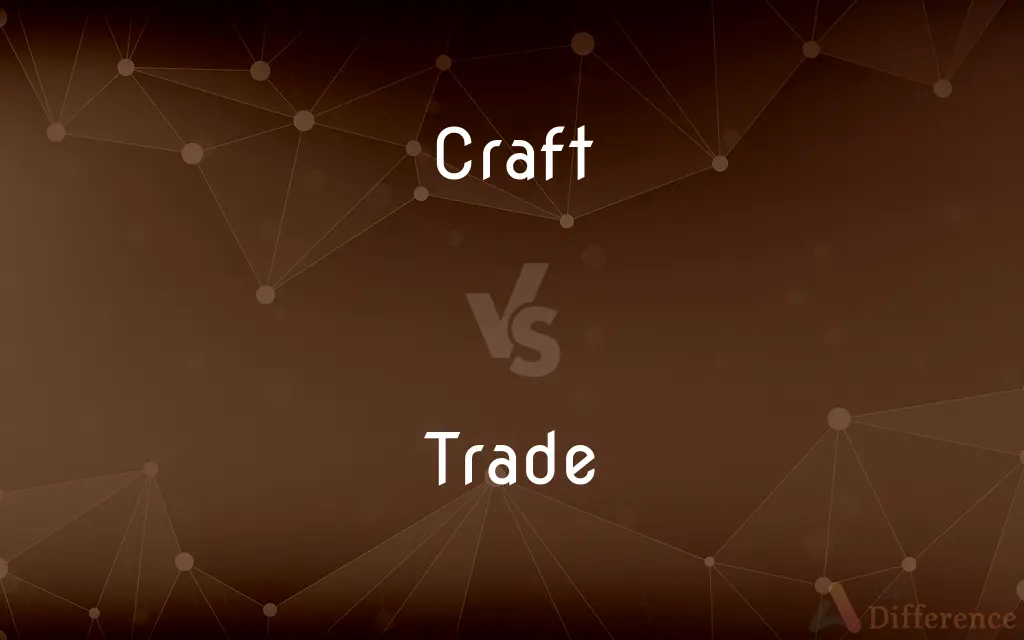Craft vs. Trade — What's the Difference?
By Fiza Rafique & Maham Liaqat — Updated on March 5, 2024
Craft involves skilled work in creating unique, handmade items, focusing on artistry and creativity, whereas trade refers to the business of buying, selling, or exchanging goods and services.

Difference Between Craft and Trade
Table of Contents
ADVERTISEMENT
Key Differences
Craft is characterized by individual skill and creativity in making decorative or functional items by hand, showing the unique artistry of the maker. On the other hand, trade encompasses the broader economic activity of buying, selling, or exchanging goods and services, often on a larger scale and not necessarily involving handcrafted items.
Craftspeople often specialize in specific materials or techniques, such as woodworking, pottery, or textiles, focusing on the quality and uniqueness of their products. Meanwhile, trade can involve a wide range of products, from mass-produced goods to services, and focuses on the exchange process and market dynamics.
The value of a craft item often lies in its uniqueness and the skill required to create it, making it a form of artistic expression. In contrast, the value in trade is determined by market demand, supply, and the ability to meet consumer needs efficiently.
Craft typically requires a significant investment of time and personal attention to detail in each piece, reflecting the maker's vision and style. Trade, however, emphasizes efficiency, volume, and the logistics of distribution to meet market demand.
While crafts may be sold as part of trade, the primary distinction lies in craft's focus on the artistry and craftsmanship of individual items, whereas trade is concerned with the economic transactions and movement of goods and services in the marketplace.
ADVERTISEMENT
Comparison Chart
Definition
Skilled creation of unique, handmade items.
The business of buying, selling, or exchanging goods and services.
Focus
Artistry, creativity, and individual skill.
Economic transactions, market dynamics.
Key Characteristics
Handmade, unique items with personal attention.
Volume, efficiency, and distribution logistics.
Value Determination
Uniqueness and craftsmanship.
Market demand and supply.
Typical Products
Decorative or functional handmade items.
A wide range of goods and services, including mass-produced items.
Compare with Definitions
Craft
The application of artistic and creative skills to produce decorative or functional items.
His woodworking craft was evident in the detailed carvings.
Trade
An economic principle based on supply and demand dynamics.
The principles of trade dictate the pricing of goods.
Craft
An occupation requiring specialized skills in making things by hand.
Glassblowing is a craft that requires years of practice.
Trade
The activity of buying, selling, or exchanging goods and services.
He worked in the trade of exotic spices.
Craft
A practice involving skilled work to create handmade, unique items.
She excelled in the craft of pottery, creating exquisite pieces.
Trade
The process involving the transfer of goods from seller to buyer.
Trade agreements facilitate the smooth exchange of products between countries.
Craft
The result of skilled workmanship, producing items with a personal touch.
The craft fair showcased handwoven textiles and ceramics.
Trade
A business activity focused on the movement of products in the market.
Her expertise in international trade helped the company expand.
Craft
A craft or trade is a pastime or an occupation that requires particular skills and knowledge of skilled work. In a historical sense, particularly the Middle Ages and earlier, the term is usually applied to people occupied in small scale production of goods, or their maintenance, for example by tinkers.
Trade
The business which a person has learned, and which he engages in, for procuring subsistence, or for profit; occupation; especially, mechanical employment as distinguished from the liberal arts, the learned professions, and agriculture; as, we speak of the trade of a smith, of a carpenter, or mason, but not now of the trade of a farmer, or a lawyer, or a physician.
Accursed usury was all his trade.
The homely, slighted, shepherd's trade.
I will instruct thee in my trade.
Craft
Skill in doing or making something, as in the arts; proficiency.
Trade
The profession or skill of engaging in commercial transactions.
He mastered the trade of negotiating deals for high-end real estate.
Craft
Ability, skilfulness, especially skill in making plans and carrying them into execution; dexterity in managing affairs, adroitness, practical cunning; ingenuity in constructing, dexterity .
Trade
Trade involves the transfer of goods or services from one person or entity to another, often in exchange for money. Economists refer to a system or network that allows trade as a market.
Craft
A form of expression that emphasizes individual artistry and creativity.
Her jewelry making is not just a craft but an art form.
Trade
A job requiring manual skills and special training
The fundamentals of the construction trade
He's a carpenter by trade
Craft
Crafts Items made by craftspeople.
Trade
Buy and sell goods and services
Middlemen trading in luxury goods
Craft
To construct, develop something (like a skilled craftsman).
State crafting; the process of crafting global policing
Trade
Exchange (something) for something else, typically as a commercial transaction
They trade mud-shark livers for fish oil
Craft
The skilled practice of a practical occupation;
He learned his trade as an apprentice
Trade
The business of buying and selling commodities, products, or services; commerce.
Craft
People who perform a particular kind of skilled work;
He represented the craft of brewers
As they say in the trade
Trade
A branch or kind of business
The women's clothing trade.
Craft
Skill in an occupation or trade
Trade
The people working in or associated with a business or industry
Writers, editors, and other members of the publishing trade.
Craft
Make by hand and with much skill;
The artisan crafted a complicated tool
Trade
An exchange of one thing for another
Baseball teams making a trade of players.
Trade
To sell or exchange in commerce; to barter.
They traded the persons of men.
To dicker and to swop, to trade rifles and watches.
Trade
A particular instance of buying or selling;
It was a package deal
I had no further trade with him
He's a master of the business deal
Trade
Exchange or give (something) in exchange for
Trade
Do business; offer for sale as for one's livelihood;
She deals in gold
The brothers sell shoes
Trade
Relating to or used in or intended for trade or commerce;
A trade fair
Trade journals
Trade goods
Common Curiosities
Can craft items be involved in trade?
Yes, craft items can be sold and bought within the trade system, merging the uniqueness of crafts with the economic dynamics of trade.
Is craftsmanship important in trade?
While craftsmanship is crucial in the creation of craft items, trade primarily values the efficiency, volume, and logistics of distributing goods and services.
What distinguishes craft from trade?
Craft focuses on the skilled creation of unique, handmade items, emphasizing artistry and individual creativity, whereas trade involves the buying, selling, or exchanging of goods and services.
What role does innovation play in craft and trade?
In craft, innovation can lead to the development of new techniques, materials, and designs, enhancing artistic expression and uniqueness. In trade, innovation focuses on improving efficiency, reducing costs, and creating new markets or opportunities for goods and services.
How do craft and trade contribute to the economy?
Craft contributes through the creation of unique, high-quality items, often supporting local economies and cultural heritage. Trade facilitates economic growth by enabling the exchange of goods and services across markets.
Can someone be involved in both craft and trade?
Yes, artisans and craftspeople can engage in trade by selling their handmade items, thus participating in both crafting unique products and the economic transactions of trade.
What skills are important for trade?
Important skills for trade include market analysis, negotiation, logistics management, and an understanding of supply and demand dynamics.
What skills are necessary for craft?
Skills necessary for craft include manual dexterity, creativity, artistic ability, and a deep understanding of materials and techniques.
How do cultural influences affect craft and trade?
Cultural influences significantly shape the styles, methods, and materials used in crafts, reflecting local traditions and heritage. In trade, cultural differences can impact market preferences, demand for certain goods, and international business practices.
How does technology impact craft and trade?
Technology enables craftspeople to reach wider markets through online sales, while in trade, it streamlines processes, improves logistics, and enhances market analysis.
Can craft become industrialized, or does it lose its essence?
While craft can be scaled up through industrial methods, this often shifts the focus from individual artistry to mass production. True craft prioritizes handmade quality and uniqueness, which may be diluted in industrialization.
How do environmental concerns intersect with craft and trade?
In craft, environmental concerns can lead to sustainable practices, such as using eco-friendly materials and methods. In trade, these concerns drive the demand for sustainable products, influence supply chains, and encourage ethical trading practices.
What is the significance of local markets in craft and trade?
Local markets are vital for craftspeople to showcase and sell their work, supporting the local economy and culture. In trade, local markets offer opportunities for small and medium enterprises, serving as testing grounds for products and fostering community engagement.
Share Your Discovery

Previous Comparison
Mile vs. Mole
Next Comparison
Personal vs. IndividualAuthor Spotlight
Written by
Fiza RafiqueFiza Rafique is a skilled content writer at AskDifference.com, where she meticulously refines and enhances written pieces. Drawing from her vast editorial expertise, Fiza ensures clarity, accuracy, and precision in every article. Passionate about language, she continually seeks to elevate the quality of content for readers worldwide.
Co-written by
Maham Liaqat













































